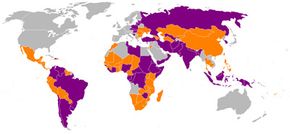Joining the Peace Corps
Prospective Peace Corps volunteers can find a recruiter or a recruiting event here. Applying for the Peace Corps is a fairly extensive process that begins with filling out an application. The application has very thorough questions about work and volunteering experiences and requires a lot of diligence in reporting any hobbies or activities, because those skills could be useful to the Corps. There are also two essays to write.
After sending in the application, the applicant will be contacted to set up an interview. The interview is a vital part of the process - recruiters try to use it to weed out applicants who aren't likely to complete their term of service, and also get a feel for the areas where the applicant's interests and skills could compliment the Peace Corps' goals.
Advertisement
Selected applicants are then nominated by their recruiter to join the Peace Corps. However, there's still a long way to go. The nominee must clear medical and legal hurdles. Certain medical conditions preclude entry into the Peace Corps, while some may restrict the nations the nominee can work in or delay entry into the Corps until the condition has gone away or stabilized [Source: Dillon Banerjee].
Once all clearances are obtained, the nominee will receive an official invitation to join the Peace Corps, with just 10 days to decide whether to accept or decline. The invitation will include general information on the nominee's deployment - a sometimes vague region of the world where he will be sent (i.e. Asia) and a description of their volunteer job. Upon acceptance, more specific information is forthcoming. The nominee receives a departure date, an appointment for a pre-departure orientation, and then he's sent off for the three-month, in-country training period.
Although an applicant's interest in serving in a particular part of the world is taken into consideration, the Peace Corps' ability to use a particular person's skills in a given region is higher priority. In other words, the Corps will send you where they need you.
Certain skills make Peace Corps applicants more competitive. Although every volunteer receives training in the skills he'll need to do his work, it is crucial to have some foreign language experience (although all volunteers are taught the language of the country they'll be living in during training), volunteering experience, ability to organize and lead others and experience working in the same field as their volunteer work. This can include hobbies. For example, someone interested in the Peace Corps' forestry and agriculture program might have worked for a summer at a garden center or landscaping service, or helped plant and cultivate a community garden.
